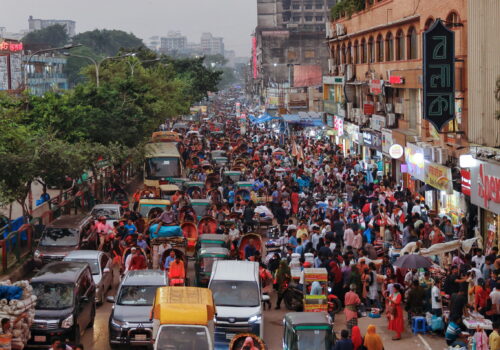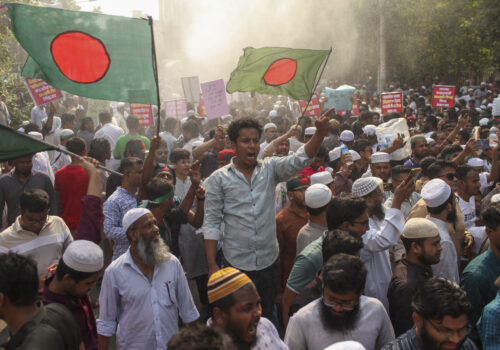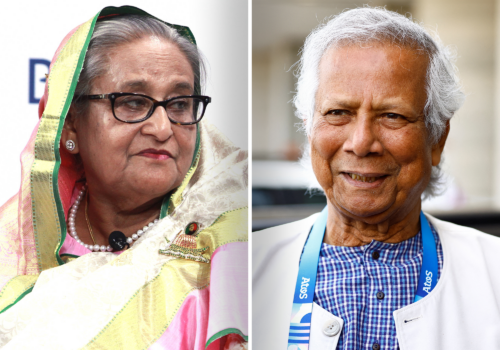What Bangladesh has achieved in the year since its revolution
Although a year has passed since former Prime Minister Sheikh Hasina was forced to flee the country in the face of a mass uprising, the spirit of Bangladesh’s July Revolution is still alive on the campus of Dhaka University. From the graffiti on the university walls to the eyewitness testimonials of students who helped overthrow her regime, a walk through the campus helps to put into context all that the country is still grappling with as it marks the one-year anniversary of Hasina’s ouster. Most importantly, it underscores the insistence of those who led the uprising that the former regime not be allowed to return to power.
On the one-year anniversary of Hasina’s departure on August 5, Chief Advisor Muhammad Yunus announced that elections would be held in early February 2026, putting an end to much of the uncertainty about the length of the interim government’s tenure. Yunus also promulgated the July Declaration, enshrining the core principles that guided the July Revolution. The political parties also reached agreement on a July Charter laying out their shared commitment to reforms intended to prevent the rise of another authoritarian government. Taken together, the announcement of the election date and the agreements on the reform process have cleared the path for the return of electoral politics.
The interim government has much to celebrate as it marks its one-year anniversary. From the chaos that immediately followed Hasina’s departure, the interim government was able to restore the basic functioning of the state. This was no simple task given the degree to which the civil service and security forces had been politicized during the Awami League’s fifteen years in power. Even more importantly, the interim government’s economic team moved swiftly and decisively to head off an incipient collapse of the banking system, which had been looted by Hasina’s cronies. To their credit, Bangladesh’s international partners, including the World Bank, the Asian Development Bank, and the International Monetary Fund, worked closely with the interim government to shore up the country’s shaky financial system.
The search for justice is complicated by the flight of many of the alleged perpetrators.
Leveraging the international network of Yunus, a Nobel Laureate and economist, the interim government assembled a broad international coalition to support its efforts to promote reforms and prepare to hold free and fair elections. Bangladesh has worked to repair relations with its traditional partners, including the United States, which had been strained during Hasina’s tenure. After months of engagement with the Trump administration, on July 31 the interim government secured a new framework agreement on trade with Washington, under which Bangladesh’s exports to the United States would be subject to a competitive 20 percent tariff. At the same time, Bangladesh has also enjoyed cordial relations with China, with Yunus meeting Chinese President Xi Jinping in March. However, the interim government’s relations with India have remained frosty, despite Yunus’s meeting with Indian Prime Minister Narendra Modi in April.
Perhaps the most difficult challenges the interim government has faced are ensuring accountability for the crimes committed during Hasina’s tenure and providing the regime’s victims with a degree of justice. These crimes are not limited to the horrors inflicted on protesters in July and August of 2024, which the United Nations has documented. They also include the many extrajudicial killings, enforced disappearances, and other abuses that preceded the July uprising. The search for justice is complicated by the flight of many of the alleged perpetrators, who left the country in the chaos surrounding the regime’s fall. Hasina and many of her key lieutenants have been granted refuge in India, where they are able to meet freely despite the charges against them.
While Hasina remains in exile, the International Crimes Tribunal (ICT), a Bangladeshi judicial institution established in 2009, has begun trials against her and others with command responsibility for her regime’s actions during July and August 2024. Meanwhile, the interim government has memorialized these abuses by establishing a museum on the grounds of Hasina’s former official residence in Dhaka. Many of the victims of the Hasina government continue to face material and psychological challenges, and resources to address these needs remain scarce. There are early efforts to establish a Truth and Healing Commission, which would seek to document the crimes committed during Hasina’s regime and allow for restitution to assist victims and their families.
Currently, there seems to be little appetite for reconciliation from either the victims or the perpetrators. The Awami League, the former ruling party under Hasina, remains banned pending the outcomes of the ICT trials, and the party will likely not be allowed to participate in the next elections. Human rights groups continue to raise concerns about Awami League members and supporters who are currently in custody, many of whom face charges that seemingly lack sufficient evidence to justify their detention. It will most likely fall to the next elected government to decide on the fate of these detainees as part of its wider approach to accountability, justice, and reconciliation.
While it is the eighth most populous country in the world, Bangladesh does not receive the attention it deserves, with very few experts in the United States or elsewhere paying close attention to developments there. Consequently, it is easy for those who wish to spread misinformation or disinformation to influence the narrative about the country. This has certainly been the case over the past year, as a narrative has emerged that post-Hasina Bangladesh has unleashed a genocide against the minority Hindu community, opened the door to Islamist extremism, and sold the country off to China. None of this is accurate, and it’s important to set the record straight as the country moves toward new elections.
Over Hasina’s fifteen years in power, Bangladesh increasingly shut itself off from the rest of the world. It denied visas to journalists, academics, and researchers, and it severely restricted freedom of speech. Now that the country has opened its doors once again, it is time for the world to pay closer attention to Bangladesh as it works to bolster its economy, pursue justice and accountability for the crimes of the Hasina regime, and reestablish democratic governance.
M. Osman Siddique is a nonresident senior fellow at the Atlantic Council’s South Asia Center. He previously served as the US ambassador to the Republic of Fiji with concurrent accreditations to the Kingdom of Tonga, the Republic of Nauru, and the Government of Tuvalu from 1999 to 2001.
Jon Danilowicz is a retired US Department of State foreign service officer, with extensive experience in South Asia, including service as deputy chief of mission at the US Embassy in Dhaka. He currently serves as the president of Right to Freedom, a Washington, DC- based human rights organization.
Further reading
Tue, Jan 28, 2025
After the Monsoon Revolution, Bangladesh’s economy and government need major reforms
Freedom and Prosperity Around the World By
In 2024, Bangladesh’s student-led “Monsoon Revolution” ousted an entrenched autocratic regime, marking a historic shift. Yet, with deep systemic corruption and political resistance, the road to stability remains uncertain.
Mon, Aug 4, 2025
Bangladesh’s revolution is at a crossroads. Open elections are the best way forward.
New Atlanticist By
The promising uprising last year now risks becoming a system in which power, not principles, determines who gets to participate in democracy.
Wed, Aug 7, 2024
Hasina is out. Yunus is in. Here are the three biggest factors to watch in Bangladesh.
New Atlanticist By Ali Riaz
Prime Minister Sheikh Hasina has fled Bangladesh, and Nobel Prize–winner Muhammad Yunus will lead an interim government. But several important questions remain unanswered.
Image: August 5, 2025, Dhaka, Dhaka, Bangladesh: Chief Adviser Professor Muhammad Yunus read out the historic July Declaration on August 5, 2025, at the South Plaza of the National Parliament Building in the presence of national leaders, members of martyred families, July injured fighters, politicians, and diplomats. Since morning, hundreds of thousands of people had gathered at Manik Mia Avenue to attend the July Mass Uprising Day program and listen to the reading of the July Declaration. (Credit Image: © Rubel Karmaker/ZUMA Press Wire) REUTERS


